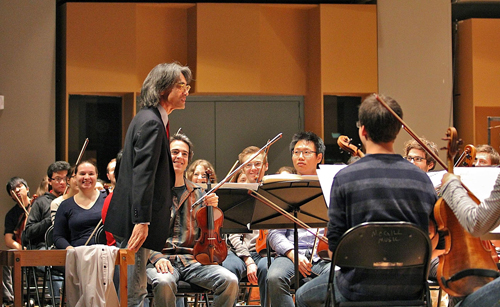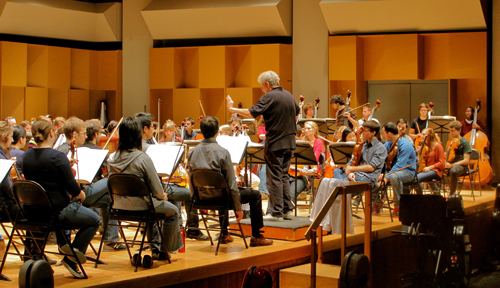
By Katherine Gombay
Musicians know a lot more about acoustics than the rest of us. They have to because a successful performance career is not just about mastering an instrument or about projecting a certain kind of musical personality or style. It’s also about understanding how the performance space affects the sound itself, and adjusting to it.
That’s why Douglas McNabney, the Interim Chair of the Performance Department at the Schulich School of Music is so excited about the McGill Symphony Orchestra’s concert this week at the Place des Arts. “A superior concert facility fundamentally changes the way you play your instrument,” says McNabney. “That’s why we were so happy to be able to give our students the chance to perform at a state-of-the-art hall like the Maison Symphonique. It’s going to be a great addition to their education.”
This performance came about as a result of the close ties between the Orchestre symphonique de Montréal (OSM) and McGill’s Schulich School of Music. Many of the principal musicians from the MSO are also instructors at the Schulich School of Music, so they already play a role in mentoring young musicians. McNabney believes that many of them will be in the audience on Sunday to cheer their students on. In addition, in recent years, the quality of Multi-Media Room at the Schulich School of Music has brought the MSO to McGill to make recordings, including, most recently a CD of music by Beethoven CD on the Analekta label.
The concert program on Sunday is designed to give all the orchestra sections a chance to stretch their performance muscles and display their skills. It ranges from dramatic operatic pieces (the Prelude to Act III of Richard Wagner’s opera Lohengrin and the Triumphal March from the Act II Finale of Guiseppe Verdi’s Aïda) to what McNabney describes as the sophisticated and colourful French music of Maurice Ravel’s Daphnis et Chloé, Suite No. 2 .
The program also includes Laterna Magica, a piece by the contemporary Finnish composer, Kaija Saariaho, who will be on hand to receive an honorary doctorate from McGill. The ceremony will take place during the concert, and Saariaho will receive her doctorate from Maestro Kent Nagano of the Montreal Symphony Orchestra.
Thomas Fortner, a cellist who is starting his performance Masters at McGill and has been playing in the McGill Symphony Orchestra for three years, is looking forward to the experience, as much as anything, for the way that the space on stage will allow the musicians to perform differently. “Physically, we’re usually squeezed on stage together in Pollack Hall, we don’t have a lot of elbow room,” says Fortner. “As a string player we need a lot of lateral movement just to produce sound with the bow. So when you’re constantly worried that you’re going to be breaking your bow, or poking somebody or knocking somebody over – that’s an anxiety that makes you tense up, and not the most comfortable for producing sound.”

Maestro Alexis Hauser, the artistic director of the McGill Symphony Orchestra, recognizes that the experience of shifting to a new performance space is a great opportunity for the students. But he also knows that he needs to be vigilant about how he works with them so that they can give their best at the Maison Symphonique. “This orchestra has enormous energy, and one of the challenges of helping them get ready for this performance is teaching them to control it,” says Hauser. “So I’m asking them to play the pieces very slowly and getting them to articulate every little detail so that they are ready for the way the music will sound in the concert hall where the acoustics are completely different.”
Hannah Craig, a cellist who has just moved to Montreal from Toronto to start attending the Schulich School of Music is excited about the prospect of the concert, and a little daunted by it at the same time. “It’s cool that we’re going to get to play at the Maison Symphonique. But we’re one of the first university orchestras to perform there, so that’s a lot of pressure. We have a big responsibility to perform well and to show the audience what we can do. I’m really looking forward to it.”
The McGill Symphony Orchestra under the direction of Maestro Alexis Hauser will be performing at Maison Symphonique de Montreal (1600 St. Urbain Street), on Sunday, Nov. 3 at 2 p.m.
For information about the concert, go here.
To hear from some of the students in the McGill Symphony Orchestra about what turned them onto classical music check out this CBC feature about the concert.
